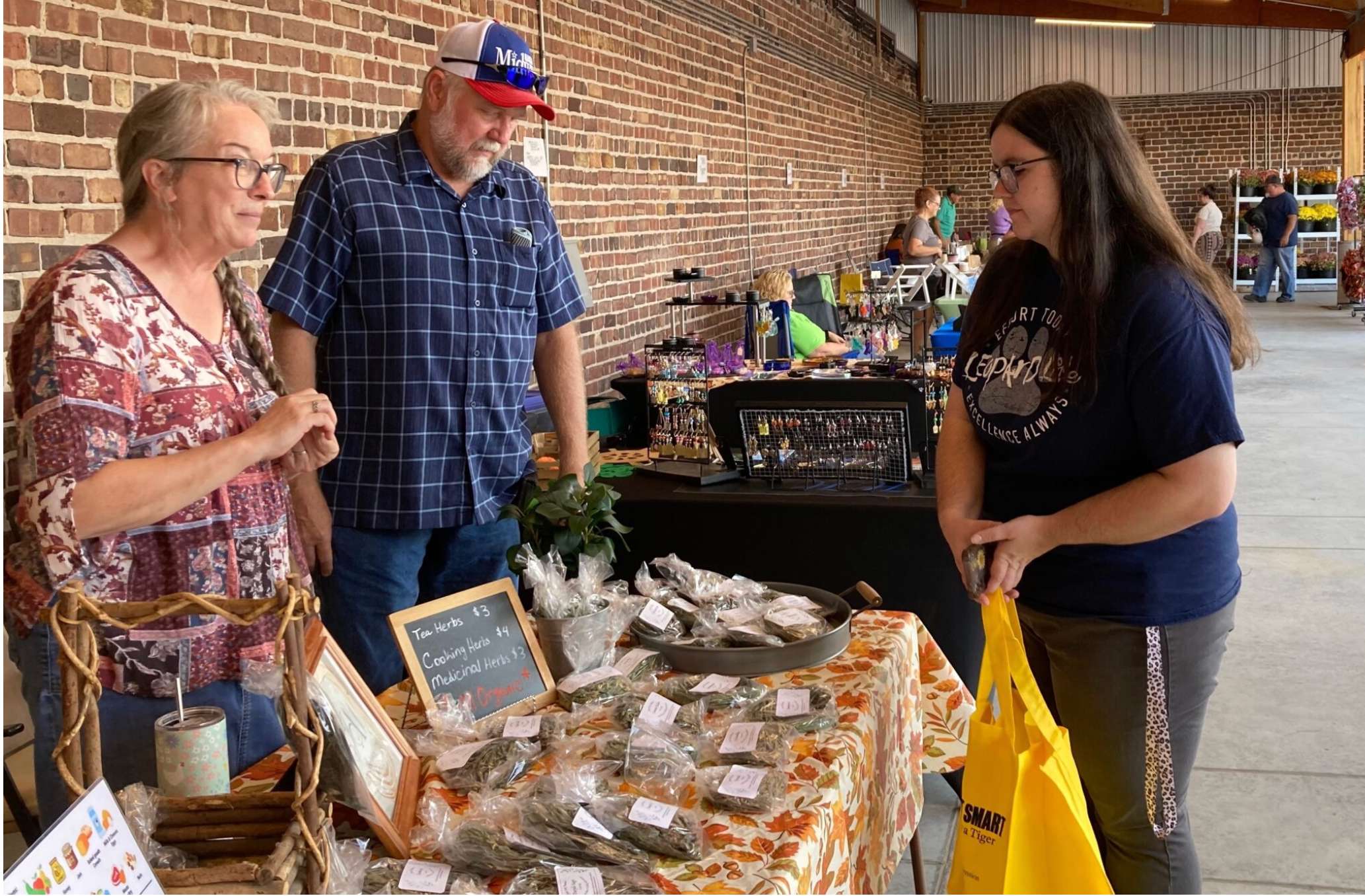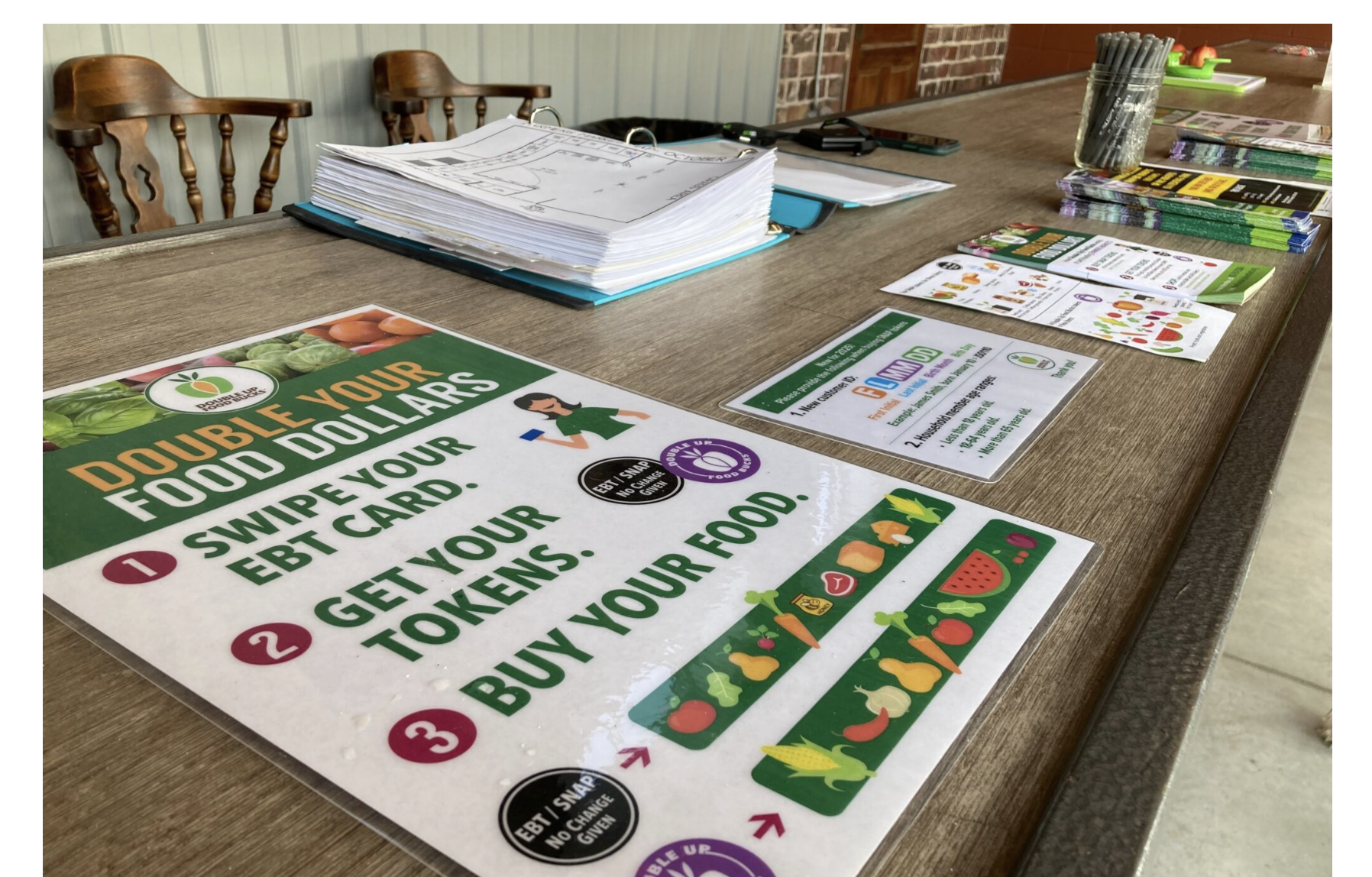
The state’s request calls for SNAP restrictions and expanded incentives for healthy purchases, but nonprofit and industry leaders are concerned that nutritious food will remain out of reach for many
By:Steph Quinn
Missouri Independent
MOBERLY — Programs to help lower-income Missourians stretch their food benefits allow many families to put fresh produce on their tables, said Kara Bunten, director of the Randolph County Farmers Market, on Thursday, the last market of the year.
Families rely on these programs “to feed their family fresh fruits and vegetables at a reduced rate, so they’re not spending all the money off their cards,” Bunten said.
Those programs, currently supported with $2 million annually of state funds, could get more help under a Supplemental Nutrition Assistance Program, also known as SNAP or food stamps, waiver application filed last week with federal officials by the Missouri Department of Social Services.
But that same waiver could bar recipients from buying soft drinks, candy and ready-to-eat desserts. And those restrictions, critics say, could mean even fewer choices for consumers in areas classified as food deserts.
In addition to “headache and complications,” the proposed restrictions could increase stigma and “cause a lot more people to not want to use those benefits,” said Christine Woody, food security policy manager at Empower Missouri, a nonprofit that advocates on behalf of low-income residents.
The waiver, with a projected implementation in October 2026, needs approval from the U.S. Department of Agriculture, which operates the SNAP program.
The request was filed after Gov. Mike Kehoe issued an executive order Sunday calling on the department to run SNAP “in a manner that prioritizes healthy foods.” It comes as federal changes passed by Congress in July narrow eligibility to receive benefits and impose additional costs on the state to ensure that SNAP users meet stricter work requirements.
In August, 667,531 Missourians were receiving SNAP benefits, according to the Family Support Division. More than 41% of them were children.
This spring, efforts failed in the General Assembly to prohibit SNAP recipients from buying candy and soda with their benefits.
Gabby Picard, a spokesperson for the governor’s office, said in an email that “while no specific food items are being identified at this point in the process,” the restrictions proposed in the request reflect “initial language DSS plans to use to evaluate specific food items, upon USDA approval.”
Kehoe’s executive order also called on the department to “incentivize the purchase of fresh fruits, vegetables, and Missouri-produced meats and dairy products” with food assistance, without specifics.
Retailer bear upfront costs
Dan Shaul, executive director of the Missouri Grocers Association, which will participate in the process to implement the waiver, said that wherever Missouri decides to draw the line between “what is healthy and what is not healthy,” the changes will cause “confusion” for SNAP users and retailers.
Shaul gave the example from Indiana, one of 12 states that has secured USDA approval to restrict SNAP purchases. When Indiana’s waiver begins in January, Shaul said, Snickers bars will be excluded as candy, while Twix will not, due to a definition in the state’s tax code.
“One would think, ‘It’s got peanuts in it, so it’s got to be the food,’” Shaul said of Snickers. “It’s absolutely the candy. The Twix is considered food because it has flour in it.”
The dilemma for SNAP users, Woody said, is knowing which foods are eligible and which are not.
“You bring a whole cart of groceries, and you put them on there,” she said, “and then they’re like, ‘You can’t have that,’ or ‘You can’t have that.’”
Shaul said that although retailers will bear the upfront cost of reconfiguring their systems to implement restrictions, some of the expense will be passed to shoppers, whether they use SNAP or not.
“There’s going to be administrative costs, there’s going to be training costs, and ultimately, in an industry that [has] normally a 1% margin, any cost is going to be felt at the end, at the consumer,” Shaul said. “We’ll do everything we can to minimize it, but there’s truly going to be issues.”
‘A stick instead of a carrot’

State Sen. Maggie Nurrenbern, a Democrat from Kansas City, questioned whether the request would help low-income Missourians to eat healthier.
“The issue with using a stick instead of a carrot when it comes to this approach of healthy eating is that we are doing nothing, nothing at all, to actually help get healthy food into the household of Missourians,” Nurrenbern said.
Kehoe’s executive order called on the state to incentivize SNAP users to buy healthy, locally produced food, but did not specify how the state should do this.
Kehoe called for the expansion of programs like Double Up Food Bucks, which allows SNAP users to double the fresh fruits and vegetables they bring home from select grocery stores and farmers markets.
Karissa Kary, president of the Missouri Farmers Market Association, said vendors would welcome more support for Double Up Food Bucks.
“The state stepping up to help support that further would be incredible, because it allows opportunities for both farmers and people on food assistance to get the freshest, most local food that is in the area,” Kary said.
But Kary said that although vendors would benefit from more incentives to buy fresh produce, they are wary of more state rules on top of impending changes to the program on the federal level. Bakers, for instance, will need “clarity” on what Missouri will count as a “prepared dessert.”
“It is very difficult for farmers markets to get the accreditation and everything they need to accept SNAP dollars,” Kary said. “So the fear of losing it or being fined for doing something inadvertently incorrect is really scary for a lot of small vendors…let alone the farmers they serve.”
Nurrenbern said many people on SNAP don’t have access to farmers markets and shopping choices are limited in many rural areas.
“It is whatever [is] on those stalls that that single mom can make quickly before she heads out the door for second or third shift,” Nurrenbern said. “And God forbid she needs a Diet Coke so she can keep going to go to that third shift that starts at 11 p.m.”








